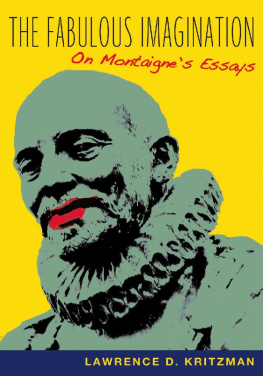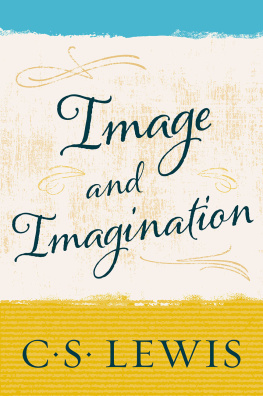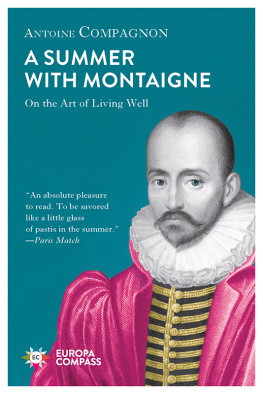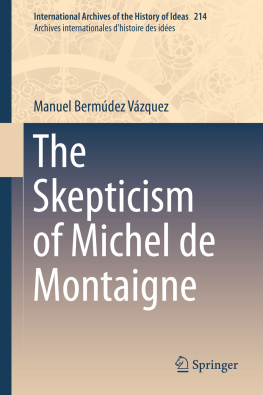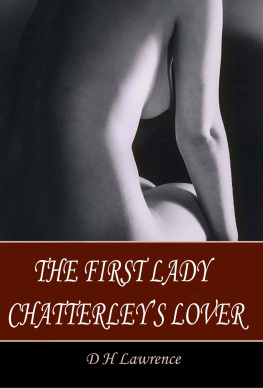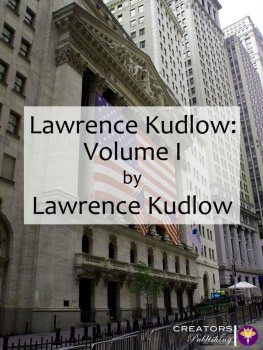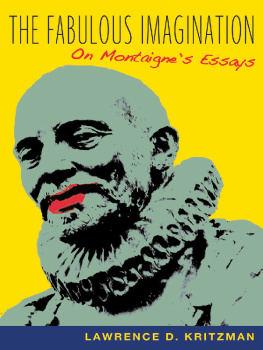Lawrence D. Kritzman - The Fabulous Imagination: On Montaignes Essays
Here you can read online Lawrence D. Kritzman - The Fabulous Imagination: On Montaignes Essays full text of the book (entire story) in english for free. Download pdf and epub, get meaning, cover and reviews about this ebook. year: 2011, publisher: Columbia University Press, genre: Science. Description of the work, (preface) as well as reviews are available. Best literature library LitArk.com created for fans of good reading and offers a wide selection of genres:
Romance novel
Science fiction
Adventure
Detective
Science
History
Home and family
Prose
Art
Politics
Computer
Non-fiction
Religion
Business
Children
Humor
Choose a favorite category and find really read worthwhile books. Enjoy immersion in the world of imagination, feel the emotions of the characters or learn something new for yourself, make an fascinating discovery.
- Book:The Fabulous Imagination: On Montaignes Essays
- Author:
- Publisher:Columbia University Press
- Genre:
- Year:2011
- Rating:5 / 5
- Favourites:Add to favourites
- Your mark:
- 100
- 1
- 2
- 3
- 4
- 5
The Fabulous Imagination: On Montaignes Essays: summary, description and annotation
We offer to read an annotation, description, summary or preface (depends on what the author of the book "The Fabulous Imagination: On Montaignes Essays" wrote himself). If you haven't found the necessary information about the book — write in the comments, we will try to find it.
The Fabulous Imagination: On Montaignes Essays — read online for free the complete book (whole text) full work
Below is the text of the book, divided by pages. System saving the place of the last page read, allows you to conveniently read the book "The Fabulous Imagination: On Montaignes Essays" online for free, without having to search again every time where you left off. Put a bookmark, and you can go to the page where you finished reading at any time.
Font size:
Interval:
Bookmark:
THE FABULOUS IMAGINATION
On Montaignes Essays
THE FABULOUS
IMAGINATION
On Montaignes Essays
LAWRENCE D.KRITZMAN

Columbia University Press New York
Columbia University Press
Publishers Since 1893
New York Chichester, West Sussex
cup.columbia.edu
Copyright 2009 Columbia University Press
All rights reserved
E-ISBN 978-0-231-51251-0
Library of Congress Cataloging-in-Publication
Kritzman, Lawrence D.
The fabulous imagination : on Montaignes Essays / Lawrence D. Kritzman.
p. cm.
Includes bibliographical references and index.
ISBN 978-0-231-11992-4 (hard cover : alk. paper) ISBN 978-0-231-11993-1
(pbk. : alk. paper)
1. Montaigne, Michel de, 1533-1592. Essais. 2. Imagination (Philosophy) 1. Title. PQ1643.k75 2009
844.3dc22
2008045954
A Columbia University Press E-book.
CUP would be pleased to hear about your reading experience with this e-book at .
References to Internet Web sites (URLs) were accurate at the time of writing. Neither the author nor Columbia University Press is responsible for URLs that may have expired or changed since the manuscript was prepared.
Columbia University Press gratefully acknowledges permission to reprint from the following: Excerpts from Frame, Donald The Complete Essays of Montaigne copyright 1958 by the Board of Trustees of the Leland Stanford Junior University .
Earlier versions of some chapters have appeared in the following publications:
Montaignes Death Sentences: Narrative and Subjectivity in De la diversion (Es-sais3.4), in Distant Voices Still Heard: Contemporary Readings of French Renaissance Literature, ed. John OBrien and Malcolm Quainton (Liverpool, Engl.: Liver-pool University Press, 2000), 20216.
Montaignes Fantastic Monsters and the Construction of Gender, in Writing the Renaissance, ed. Raymond C. La Charit (Lexington, Ky.: French Forum, 1992), 18396.
Montaignes Fraternity, in Etienne de la Botie: Sage rvolutionnaire et poete prigourdin, ed. Marcel Tetel (Paris: Champion, 2004), 28189 . Of Ashes Born: Montaignes Surrogate Daughter, Journal of Medieval and Renaissance Studies 25, no. 3 (fall 1995): 41931.
Representing the Monster: Cognition, Cripples, and Other Limp Parts in Montaignes Des Boyteux, in Monster Theory, ed. Jeffrey J. Cohen (Minneapolis: University of Minnesota Press, 1996), 16882.
The Socratic Makeover: Montaignes De la physionomie and the Ethics of the Impossible, LEsprit Crateur 46, no. 1 (spring 2006): 7585.
To Jeremy,
whose fabulous imagination as actor and comedy writer
gave us so much joy
CONTENTS
The origin of this book stems from two appointments as visiting professor at Harvard and Stanford Universities, where I taught graduate seminars on Montaigne and the Imagination. I wish to thank my colleagues and students at those institutions for their kind invitations, which enabled me to explore this subject more fully.
I am also grateful to a number of institutions that invited me to present lectures, which helped me to come to terms with my work-in-progress on Montaigne and to clarify my ideas. These include: Columbia, Cornell, Duke, Grinell College, Harvard, Johns Hopkins, New York University, the Universities of Miami, Michigan, and Paris IV (Sorbonne), Stanford, and Whitman College.
I would like to recognize the encouragement and feedback I received from Tom Conley, Kathleen Perry Long, Richard Regosin, and the late Marcel Tetel. Their thoughtful comments helped me to gain a better understanding of Montaigne.
I wish to thank the following friends and colleagues who offered support along the way: Ehsan Ahmed, Faith Beasley, Michel Beaujour, Tom Bishop, Howard Bloch, Christian Delacampagne, Jacques Derrida, Philippe Desan, Nelly Furman, Floyd Gray, Daniel and Janice Gross, Ralph Hester, Vivian Kogan, David La Guardia, Franoise Li-onnet, Gisle Mathieu-Castellani, Pierre Nora, Franois Noudelmann, John OBrien, John Rassias, Domna C. Stanton, and Zahi Zalloua.
Jennifer Crewe, associate director of Columbia University Press, has been an exceptional editor. I owe her a special debt of gratitude for her continued advice and encouragement. I also wish to thank freelance copy editor Henry Krawitz for having perfected my manuscript and Malcolm Debevoise for having translated from the French an earlier version of one of the chapters.
Without the constant encouragement of Dr. Stuart Pizer, who enabled me to explore my own imagination, this project would never have been completed. My friend and colleague Brian J. Reilly offered me attentive criticism and editorial advice. One could not have asked for a better intellectual interlocutor. Lastly, I owe a special debt of gratitude to the Pat and John Rosenwald Research Professorship, which enabled me to research and write this book.
Lawrence D. Kritzman
New York and Paris
Winter 2008
Literature begins at the moment that literature becomes
a question.
MAURICE BLANCHOT
Act so that there is no use in a center.
GERTRUDE STEIN

It has often been said that the French think too much and that they have invented a theory for almost everything. Montaigne represents the beginning of a philosophical tradition in French letters in which ontological and epistemological concerns intersect. In his exploration of the self Montaigne poses the same questions that Socrates posed in antiquity and that modern psychoanalysis had adapted: How shall I live? How can I know myself? By posing these questions Montaigne, like Socrates before him, sought to explore the unexamined life independently of what one might refer to today as the normative constraints of what it means to know.
Montaigne was the first thinker in the Western tradition to explore human subjectivity in a profound way. In exploring the self, Montaignes Essays ( Essais ) reflect vital concerns that continue to haunt us today: what it means to exist and to follow nature; monsters, nightmares, and traumatic memories; fear of impotence and the fragility of gender; coping with the death of loved ones and the anticipation of ones own death; thoughts about the future and of what one leaves behind; and mimicry as a tactic of diversion in coping with the human condition. The quest for self-knowledge that this enterprise entails represents the desire to see and to imagine the self from a variety of vantage points.
For Montaigne philosophy is an impossible engagement since he views thought as a destabilizing agent that is open to constant revision. The essayist doubts the possibility of attaining closure in the act of interpretation: Qui ne diroit que les glosses augmentent les doubtes et lignorance, puis quil ne se voit aucun livre, soit humain, soit divin, auquel le monde sembesongne, duquel linterpretation face tarir la difficult? Quand est-il convenu entre nous: ce livres en a assez, il ny a meshuy plus dire (III, 13, 1067) (Who would not say that glosses increase doubts and ignorance, since there is no book to be found, whether human or divine, with which the world busies itself, whose difficulties are cleared up by interpretation? When do we agree and say, There has been enough about this book; henceforth there is nothing more to say about it? [817]). The consequences of this phenomenon, in the quest for self-knowledge, suggest that Montaigne must theorize the human subject at the limits of the theorizable. The essayists self-portrait results from a demand requiring that the quest for signification be maintained and that through this process the grounding of both the thinking subject and knowledge itself be disabled. However, this does not imply that thought becomes arbitrary. On the contrary, intellectual activity becomes a more rigorous way of overcoming the constraints imposed by the exigency to create a purely substantive knowledge. If thought is unable to take hold of itself, it is because the imagination is subject to difference: Il nest aucun sens ny visage, ou droit, ou amer, ou doux, ou courbe, que lesprit humain ne trouve aux escrits quil entrepend de fouiller (II, 12, 585) (There is no sense or aspect, either straight or bitter, or sweet, or crooked, that the human mind does not find it in the writings it undertakes to search [442]).
Next pageFont size:
Interval:
Bookmark:
Similar books «The Fabulous Imagination: On Montaignes Essays»
Look at similar books to The Fabulous Imagination: On Montaignes Essays. We have selected literature similar in name and meaning in the hope of providing readers with more options to find new, interesting, not yet read works.
Discussion, reviews of the book The Fabulous Imagination: On Montaignes Essays and just readers' own opinions. Leave your comments, write what you think about the work, its meaning or the main characters. Specify what exactly you liked and what you didn't like, and why you think so.

